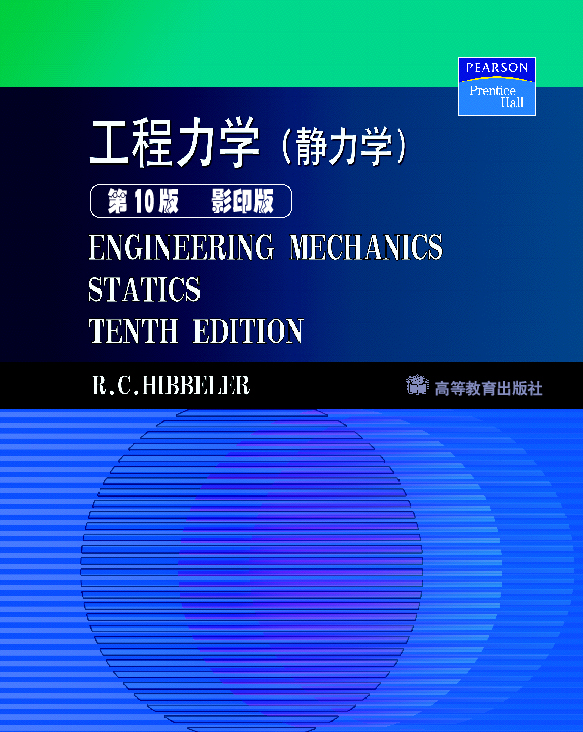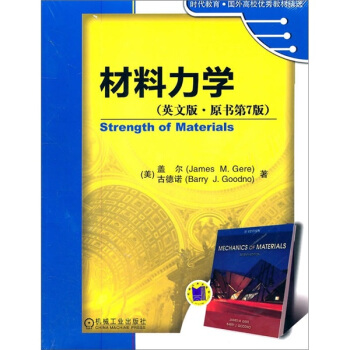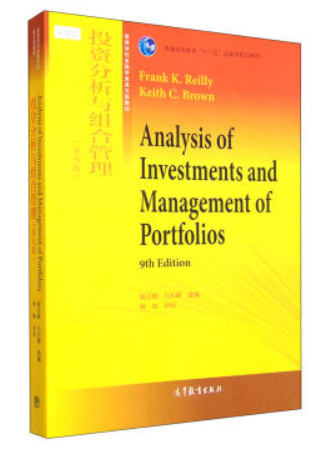工程力学(静力学)(第10版)(影印版)
作者: R.C.Hibbeler
出版时间:2004-01-30
出版社:高等教育出版社
- 高等教育出版社
- 9787040140095
- 1
- 103862
- 0045154217-9
- 平装
- 16开
- 2004-01-30
- 350
- 638
《工程力学:静力学(第10版)(影印版)》是典型的美式教材,它具有以下一些特点:基本概念、基本原理的叙述简明、准确、便于掌握, 强调理论应用,配有大量例题和习题,多来自实际问题,有利于应用理论解决实际问题能力的培养,关注学习方法的指导,详尽介绍各类问题的解决思路、方法、技巧,便于自学。
1 General Principles
Chapter Objectives
1.1 Mechanics
1.2 Fundamental Concepts
1.3 Units of Measurement
1.4 The International System of Units
1.5 Numerical Calculations
2 Force Vectors
Chapter Objectives
2.1 Scalars and Vectors
2.2 Vector Operations
2.3 Vector Addition of Forces
2.4 Addition of a System of Coplanar Forces
2.5 Cartesian Vectors
2.6 Addition and Subtraction of Cartesian Vectors
2.7 Position Vectors
2.8 Force Vector Directed Along a Line
2.9 Dot Product
3 Equilibrium of a Particle
Chapter Objectives
3.1 Condition for the Equilibrium of a Particle
3.2 The Free-Body Diagram
3.3 Coplanar Force Systems
3.4 Three-Dimensional Force Systems
4 Force System Resultants
Chapter Objectives
4.1 Moment of a Force-Scalar Formulation
4.2 Cross Product
4.3 Moment of a Force-Vector Formulation
4.4 Principle of Moments
4.5 Moment of a Force About a Specified Axis
4.6 Moment of a Couple
4.7 Equivalent System
4.8 Resultants of a Force and Couple System
4.9 Further Reduction of a Force and Couple System
4.10 Reduction of a Simple Distributed Loading
5 Equilibrium of a Rigid Body
Chapter Objectives
5.1 Conditions for Rigid-Body Equilibrium
5.1 Equilibrium in Two Dimensions
5.2 Free-Body Diagrams
5.3 Equations of Equilibrium
5.4 Two and Three-Force Members
5.4 Equilibrium in Three Dimensions
5.5 Free-Body Diagrams
5.6 Equations of Equilibrium
5.7 Constraints for a Rigid Body
6 Structural Analysis 257
Chapter Objectives
6.1 Simple Trusses 257
6.2 The Method of Joints
6.3 Zero-Force Members
6.4 The Method of Sections
6.5 Space Trusses
6.6 Frames and Machines
7 Internal Forces
Chapter Objectives
7.1 Internal Forces Developed in Structural Members
7.2 Shear and Moment Equations and Diagrams
7.3 Relations Between Distributed Load, Shear, and Moment
7.4 Cables
8 Friction
Chapter Objectives
8.1 Characteristics of Dry Friction
8.2 Problems Involving Dry Friction
8.3 Wedges 404
8.4 Frictional Forces on Screws
8.5 Frictional Forces on Flat Belts
8.6 Frictional forces on Collar Bearings Pivot Bearings and Disks
8.7 Frictional Forces on Journal Bearings
8.8 Rolling Resistance
9 Center of Gravity and Centroid 437
Chapter Objectives
9.1 Center of Gravity and Center of Mass for a System of Particles
9.2 Center of Gravity, Center of Mass and Centroid for a Body
9.3 Composite Bodies
*9.4 Theorems of Pappus and Guldinus
*9.5 Resultant of a General Distributed Loading
*9.6 Fluid Pressure
10 Moments of Inertia
Chapter Objectives
10.1 Definition of Moments of Inertia for Areas
10.2 Parallel-Axis Theorem for an Area
10.3 Radius of Gyration of an Area
10.4 Moments of Inertia for an Area by Integration
10.5 Moments of Inertia for Composite Areas
*10.6 Product of Inertia for an Area
*10.7 Moments of Inertia for an Area About Inclined Axes
*10.8 Mohr's Circle for Moments of Inertia
10.9 Mass Moment of Inertia
11 Virtual Work
Chapter Objectives
11.1 Definition of Work and Virtual Work
11.2 Principle of Virtual Work for a Particle and a Rigid Body
11.3 Principle of Virtual Work for a System of Connected Rigid Bodies
*11.4 Conservative Forces
*11.5 Potential Energy
*11.6 Potential-Energy Criterion for Equilibrium
*11.7 Stability of Equilibrium
Appendices
thematical Expressions
merical and Computer Analysis
view for the Fundamentals of Engineering Examination
Answers to Selected Problems
Index









